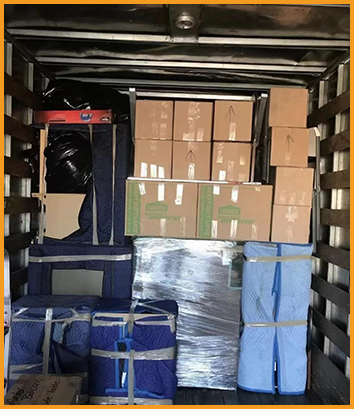GET YOUR
FREE Quote
FREE Quote




 The number of Americans moving to Israel has been steadily increasing as the region becomes more stable and job opportunities more available. Why not? There are few countries with a history and culture as rich or natural beauty as stunning. People from around the world continue to pick up and move their lives to this tiny country in the Middle East, many of them aren’t even Jewish.
The number of Americans moving to Israel has been steadily increasing as the region becomes more stable and job opportunities more available. Why not? There are few countries with a history and culture as rich or natural beauty as stunning. People from around the world continue to pick up and move their lives to this tiny country in the Middle East, many of them aren’t even Jewish.
Moving from the US to Israel might be fraught with uncertainty, but how your belongings get there won’t. We, Nobel Relocation, have been helping local people move overseas, especially to Israel, for over ten years. With deep ties in the local area, knowledge of local procedures and customs, numerous business partners in all major locations, and streamlined processes that ensure the lowest rates possible, we make your move simple, worry-free, and affordable.
Before moving to Israel, it’s important to know that the local economy can match any first world economy. Costs are similar to what you can expect from front running economies in Europe or the USA.
Israel is by far one of the priciest countries in the Middle East, whether you’re a foreigner or an Israeli citizen. In other words, just because surrounding countries have a low cost of living, it doesn’t mean Israel will match them.
Obviously, just like everywhere else in the world, it depends on your lifestyle and priorities. On the same note, like in many other countries, rent or mortgage will represent your main expense.
As a general rule of thumb, get ready to spend at least $2,000 per month. Purchase tax is 8% or 10%, depending on the value of what you purchase.
Tel Aviv is one of the most expensive cities in the world and not just in Israel. You would need at least $2,500 a month for a decent lifestyle. It’s highly recommended to live with a roommate or perhaps bring your partner over.
Getting this kind of money isn’t impossible if you get a good job.
For Israeli citizens, it’s cheaper to get a holiday, flights, and accommodation in Europe than in Tel Aviv.
Jerusalem is nearly as expensive as Tel Aviv, and housing represents an issue there because it’s limited. In fact, housing can get more expensive than in Tel Aviv, and it’s easy to tell why. After all, Jerusalem is now the capital of Israel.
A Jewish agency might be a better choice than trying to find accommodation yourself, especially if you can’t speak Hebrew.
Jerusalem is definitely expensive city, and even a simple one bedroom apartment can cost a lot, since housing is limited. Keep an eye on the exchange rate to get an idea about what you’re spending.
Despite being the third largest city, Haifa is an affordable option for both foreign citizens and those with Israeli citizenship.
Haifa may offer better value for money, though. It’s an important hub in the north side of the country, by the Mediterranean Sea, so there are lots of job opportunities. But at the same time, wages are slightly lower when compared to Tel Aviv or Jerusalem.
A person born in Israel has citizenship and doesn’t require a visa.
The Israeli immigration authorities offer more types of visas and they are extremely varied. Choosing the right one depends on a few factors, such as your nationality and your reasons to go to Israel.
Here are the main types of visas:
Immigration visa, suitable for those with Jews roots who want to live in Israel.
A/1 Temporary Resident visa, suitable for those who have been examined and approved for immigration, known as a temporary residence visa.
A/2 Student visa, also known as a study visa, for those who want to study in Israel. It covers youth students too, including elementary and high schools. It offers universal coverage for all academic institutions and youth institutions, high schools, and even private school.
A/3 Clergy visa, created for clergymen.
A/4 visa for children and spouses of those with A/2 or A/3 visas.
B/1 Work visa for those planning to work in Israel for a limited amount of time.
Working Holiday visa for young people from certain countries willing to work for a few months.
B/2 Visitor’s visa for tourists, visitors, or business people, also known as a tourist visa.
Some visas give you a chance to stay in Israel for up to a year.
There are two other types of visas, one suitable for official diplomats or members of governments and another one for Americans.
The Israel-US Investor visa is aimed at Americans and allows them to live and work in the country for at least a limited period of time in order to develop a business. Israel is also known as a start up nation because of the highest number of tech companies per capita in the world.
Some countries have different deals with the Israeli government, meaning they can travel visa free. There’s no need to visit an Israeli embassy. There are over 50 countries in this situation, plus every country of the European Union and the USA.
To make sure you don’t need a visa, it pays off contacting an embassy before you visit Israel or simply check the official website of your government.
Even if you don’t require a visa, you can stay in Israel for up to three months only.
Should you require one, start the application early, up to one year in advance. Most people sort it out within a few months only, assuming there are no issues.
Furthermore, there’s a national health insurance law, meaning you need to show proof of public or private health insurance as you enter Israel. You won’t need a medical exam for most visas, though.
Also, most visas require no annual fees, yet you might have to pay fees if you take the path to permanent residence.
There’s an Israeli law allowing Jews to come back to the Jewish state, so tens of thousands of Jewish migrants took advantage of it. At least one parent needs to be of Jewish heritage, but there are a few ways to benefit from this law.
You don’t necessarily need a Jews parent. A grandparent or other connections can also help. Making Aliyah will also help with the temporary resident visa, even if you don’t have a Jewish family member.
All in all, whether you want a work permit or you want to live in Israel, make sure you bring the following documents: passport, passport photos, birth certificate, and proof of the submission fee. Other documents will be required based on the type of visa you need.
Hebrew is the only official language in Israel, and most Jewish people speak it. Arabic used to be official, but it’s no longer that popular. However, there are a lot of people still speaking it, and many others can also understand it. It’s an accepted language, but not an official one.
Hebrew is a requirement for those attending schools in Israel. Even foreign nationals who want their kids to study in local schools must first teach them Hebrew.
For example, if you want to obtain permanent residency, dealing with the local bureaucracy can be a serious challenge, so chances are you’ll need immigration lawyers. It won’t necessarily be a problem because most professionals can speak English.
Getting health insurance or perhaps an Israeli bank account won’t raise too many issues. Traveling around Israel will be relatively simple too. You’ll find your way around anyway, as people are quite friendly.
If you choose to settle in Israel, you will need a bank account. Most high street banks have employees speaking English too. Most banks for small communities are less likely to accept foreigners. Some of them are not even official.
However, talking to an Israeli employer or perhaps immigration authorities as a foreign worker might be more difficult. When trying to find a job with local Israeli companies, it’s recommended to learn the language or maybe find a subsidiary of an international company.
Basically, you want a company that deals with customers speaking your language or has operations in your country. This way, you can get over the language barrier.
 The Holy Land, as Israel is often referred to, is completely different from other parts of the world. It’s got skyscrapers on the beach like in some parts of the USA, as well as desert roads and old fashioned communities, like in some parts of Asia.
The Holy Land, as Israel is often referred to, is completely different from other parts of the world. It’s got skyscrapers on the beach like in some parts of the USA, as well as desert roads and old fashioned communities, like in some parts of Asia.
You don’t have to be a Jewish person to live in Israel.
It’s a mix of cultures that may shock a lot of visitors. The good news is you’ll feel like a tourist for up to one year or maybe more, until you get used to everything.
The local currency is the shekel. Over the past few years, it’s been pretty stable, but different aspects of the economy can make it jump in value or lose it.
Generally speaking, an American dollar is about 3.5 shekels. It’s a great idea to do the math in your mind or perhaps use a calculator to figure out how much money you’re spending, or you may have some surprises.
The culture shock shouldn’t be too harsh, but you need to pay attention to a few small things that could get you in travel. This is why it’s important to read a few books about the local culture.
For example, avoid using your phone, driving, or using electricity in highly religious Jewish areas, such as Mea Shearim in Jerusalem.
As for your sexual orientation, it won’t raise too many issues in Tel Aviv, where people are more exposed to western influences. But then, keep it to yourself and avoid being too open about it in religious or holy places.
Permanent residents don’t like it when foreigners or young adults show off or do things they’re not used to.

With business partners in more than 180 countries around the world, we can easily land you exactly where you want to be. Our local connections in Israel’s major cities ensure that your goods are never lost in transit, and that the same kind, careful, and affordable services you get from us here will be given to you there.
We specialize in helping people move to Jerusalem, Tel Aviv, and Haifa, but we can also help you plant roots in whichever city or town you want to move into. There are a few places that we can’t reach.
We only work with the major and largest international movers in Israel to ensure great experience to our customers, and we can guarantee that!
Any time you move, there will be costs involved. Moving internationally is a whole different ball game. Nobel Relocation wants to make your move as simple as possible, helping you avoid any unnecessary costs. We do this by thoroughly outlining your moving options and going through the process with you step by step.
This includes:
Understanding your timeline
Getting an idea of the layout in your new home abroad
Honestly estimating the cost of moving
Factoring in customs costs and more
Knowing how much it’ll cost takes deep experience with national policies, and that’s why choosing an expert is the only option. If you’re planning on moving to Israel, then Nobel Relocation is your local expert. With over a decade of experience helping people just like you move from here to Jerusalem, Haifa, Tel Aviv, and the rest of the country, there’s no better choice than us.
Moving to Israel is different from port to port. For example; If you are moving from Miami to Israel, in most cases, it will take four weeks ocean time and about two more weeks to cover the time at the ports in the US and Israel. If you are moving from New York to Israel, the ocean time is a little shorter and can take about three weeks (Then you also add the two weeks port time).
At this time, due to the pandemic, all time frames are subject to many changes because of route changes by the shipping lines.
Customs regulations of Israel are subject to change at any time. The proceeding information is a brief summary of customs regulations applicable to household goods shipments to Israel (this destination) and is being provided for general guidance to assist our Agents and Customers.
Since such regulations are subject to change without notice, Nobel Relocation cannot be held liable for any costs, damage, delays, or other detrimental events resulting from non-compliance. Always double check with your local embassy or consulate before you make your move to Israel.
Israel has specific customs regulations that apply to individuals importing personal belongings into the country. Here are a few key things to know:
1. Duty-free allowance: Israel allows individuals to bring in certain items duty-free, as long as they are for personal use and will not be sold or given away. This includes items such as clothing, personal hygiene products, and a small amount of tobacco and alcohol.
2. Prohibited items: There are certain items that are strictly prohibited from being brought into Israel, such as weapons, illegal drugs, and hazardous materials.
3. Restricted items: Some items are restricted and require special permission or documentation to be brought into Israel. These may include items such as plants, animals, and some types of food.
4. Valuation of items: Customs officials may assess the value of your personal belongings and charge duty or taxes on items that exceed the duty-free allowance.
5. Importing a vehicle: If you are planning on bringing a vehicle with you to Israel, you’ll need to obtain special permission and meet certain requirements, such as obtaining an import permit and paying duties and taxes.
It’s important to familiarize yourself with Israel’s customs regulations before you move, as failure to comply can result in delays, fines, or even the confiscation of your belongings. If you have any questions, it’s a good idea to contact the Israeli Customs Authority for more information.
Israel is a developed country and a representative democracy with a parliamentary system and universal suffrage. The Prime Minister leads Israel’s parliament, and the Knesset serves as Israel’s legislative body. The economy, based on the nominal gross domestic product, was the 41st-largest in the world in 2008. Israel ranks highest among Middle Eastern countries on the UN Human Development Index, and it has one of the highest life expectancies in the world. Jerusalem is the country’s capital, although it is not recognized internationally as such.[a] In 2010, Israel joined the OECD.
Because we are professionals and specialists in International Moves and Relocation.
Because our services cover nearly the entire globe.
Because our worldwide agencies are present in 186 countries.
Because we are proud of our record—100% satisfied customers!
ARE YOU MOVING FROM ISRAEL TO USA? – PRESS HERE
Israel Embassy and Consulate List
3514 International Dr NW
Washington DC 20008
Phone: 202-364-5500
100 N. Biscayne Boulevard
Suite 1800
Miami, FL 33132
Phone: 305-925-9400
1100 Spring St. N.W. Suite 440
Atlanta, Georgia 30309
Tel: (404) 487-6500o











Ⓒ 2025 – All Rights Are Reserved – MEETOOG & DOR SALAMA